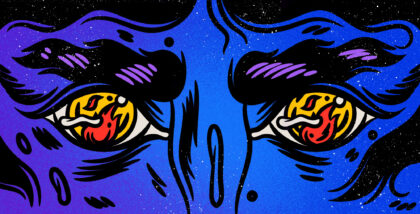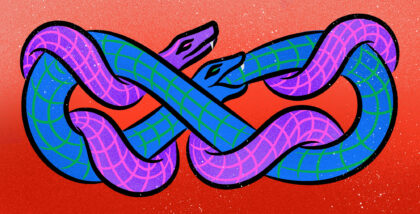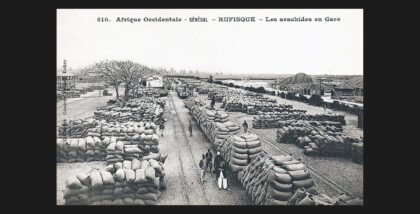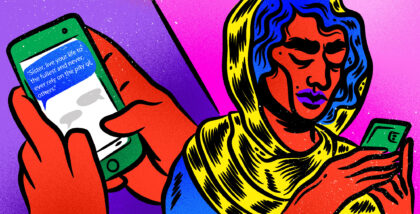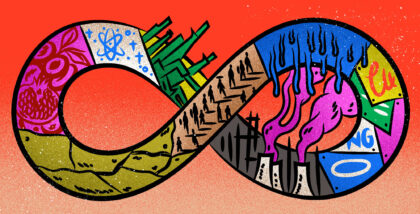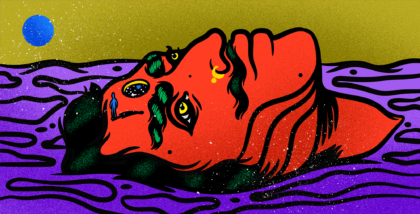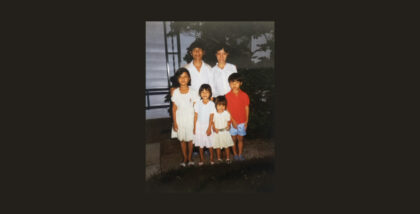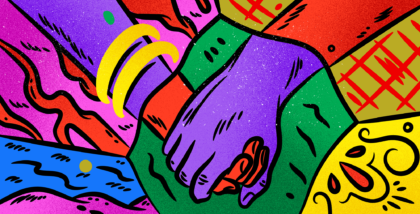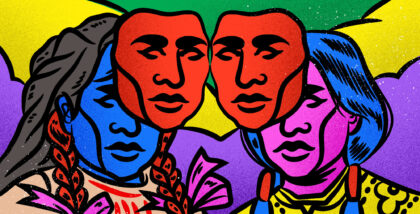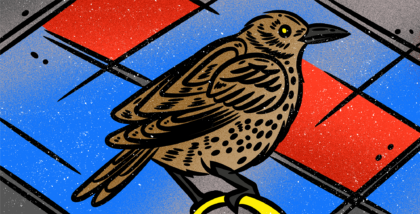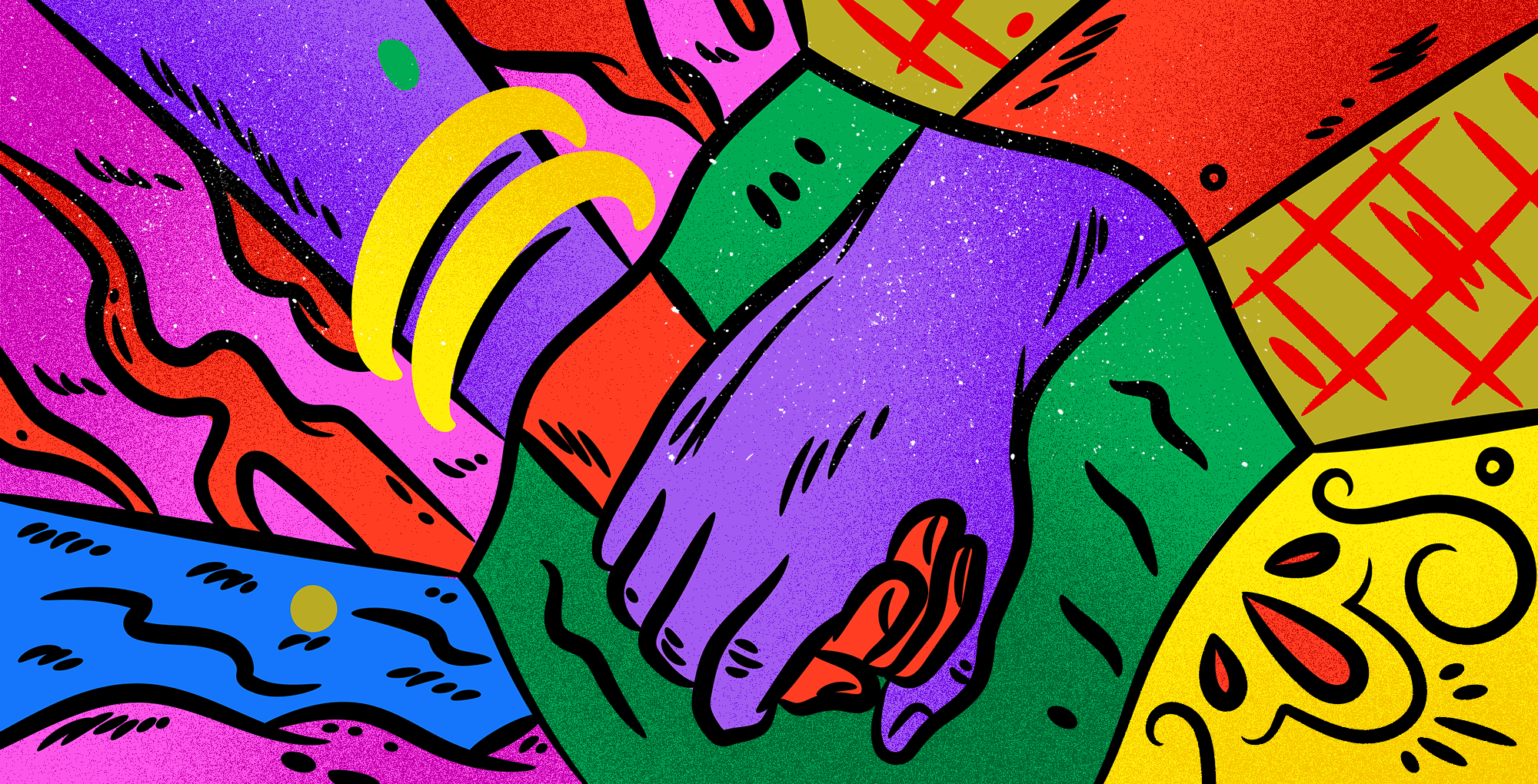 Art by Osheen Siva
Art by Osheen Siva
we forget we
remember one history
to forget another.
—Philip Metres, “Mob Scene: Belfast 1969”
When I was a toddler, my maternal grandmother would tell me that if I should ever get lost, she would recognize me by the oval birthmark on my left wrist.
This is a promise Babushka made often, year after year, when she picked me up from daycare, or took me to the park, or when we stood in grocers’ lines, when she held my marked hand and told me fairytales she invented on the spot, fairytales that included me and characters from my favorite Soviet television puppet show. Each one began with a conventional folktale setting-off: “Once upon a time Anyechka left home and went…”
Mama taught nights at a technical college, Dad worked two psychiatry shifts at a government-run rehab, and Babushka, who lived with us and taught German at a second-tier college during the day, kept me company every evening. She was my first storyteller, mythmaker. Her repertoire was inexhaustible. She told me many other tales, stories of when Mama was a little girl, anecdotes of Babushka’s own childhood, some of which I would forget and some of which I would remember and some of which I would, much later, learn were make-believe.
*
Babushka was born in Leningrad on April 27, 1927, and had a relatively unhappy childhood. Her mother, an actress, moved away to work in a provincial theater in Murmansk, north of the Arctic Circle, and her father parked Babushka with his sister’s family in a large and cluttered communal apartment. As a young child, she often threw temper tantrums. After the city came under siege by the Nazis on September 8, 1941, food ran out quickly. Babushka’s aunt made aspic out of carpenter’s glue she flavored with peppercorns and bay leaf. That autumn, an average of five thousand people were dying of hunger in the city each day. Corpses littered the streets, the staircases, the courtyards. Baroque edifices became sepulchers. So great was the famine that people were eating their dead; by the end of the siege an estimated eight hundred thousand civilians died in Leningrad. Babushka, fourteen at the time, managed to evacuate; she and her mother spent the war as refugees in northern Kazakhstan. My last private conversation with her was about her flight from the war.
Babushka was 48 when I was born, but her refrain for me was always this: Staraya babka uzhe, Gramma’s become an old hag. When I asked her to tell me her evacuation story she was 82, a retired professor with a doctorate in linguistics, a brilliant instructor who still tutored German to adoring students, and she had a new refrain: Vsyo zabyvayu, I’m forgetting everything. 13 years ago I returned to Russia on a rare visit from the states after emigrating in 2004, and we sat down at the kitchen table in her single-bedroom apartment in the heart of St. Petersburg. Everything there was sticky with grime: the table, the chairs on which we sat, the enormous 19th-century carved oak Welsh dresser. Babushka was forgetting to clean.
I had brought a ceramic bottle of Riga Black Balsam, her favorite liqueur, a bitters the color of crude oil. She had some homemade cabbage pie that my mother—her daughter—had made for her, but it was stale and, I thought, a little moldy. It must have sat in her antique Welsh dresser a week or longer, forgotten. Babushka used to cook our meals when I was growing up, but Mama said she didn’t cook anymore, and didn’t really eat, that she preferred an occasional diet of sliced hard salami and chocolate. She pecks, Mama said, using the verb meant for birds. Babushka had been losing weight.
I was a war reporter then, and it was the year I documented violence in Chechnya and Afghanistan, listened to soul-killing recountings of torture in the awkward parlors of Iraqi refugees in Amman. My private panopticon of loss by then consisted of genocide and mass starvation, loved ones who had been executed, friends’ children who had died of preventable diseases. I was naive enough to think I knew what war felt like. I thought that having witnessed first-hand exodus, exile, flight, and death had prepared me to receive the story of Babushka’s own migration from the famine—a story she had never told me when I was little.
*
The story Babushka told me went like this:
When Nazi Germany invaded the Soviet Union in June of 1941, she was a 14-year-old girl living in an old Leningrad apartment with her aunts and cousins. By winter the only way out of Leningrad was via an ice road, officially called Military Road No. 101 but popularly known as the Road of Life. It trekked across twenty miles of the frozen surface of Lake Ladoga, east of the city, the largest lake in Europe. More than a million refugees would take this road during the 900-day siege to get to safety on the lake’s eastern shore. The shortage of food in Leningrad was so dire that the government mandated all children under the age of fourteen to evacuate: they were a burden on the storehouses and a distraction to working adults, who subsisted on daily rations of nine ounces of bread and whatever they could scavenge. Babushka’s relatives paid the price of passage for her and her cousins to cross the ice by truck; Babushka would link up with her mother on the other side. (Here I nodded: I had seen such trucks of mercy in war zones. I could picture my grandmother and her cousins aboard, I could smell the quilts soiled with diesel and piss and soup and fear. In modern English, these types of migrants are called unaccompanied minors.) The adults paid the truck driver up front, and gave the children a bottle of vodka to reward him after he delivered them to safety.
But the children were foolish. They gave the bottle to the driver right away.
Picture Babushka at 14. She is barely over five feet tall and gap-toothed and too thin. She has bright blond hair that escapes willfully from two long braids, breasts that are just starting to show and are still painful to the touch. She is a girl child in a monstrous folktale. It is dark in the back of the truck under a tarp and quilts, and it is cold, and she falls asleep next to her cousins. She does not know that the truck is no longer moving: the driver has drunk all the vodka and fallen asleep before even reaching the ice, and the convoy of trucks in which he was supposed to cross the Road of Life has left without him. What wakes her is the sudden noise. Nazi artillery has struck the convoy on the ice ahead. The water is seven hundred frigid feet deep. There are no survivors.
*
“Everything is held together with stories,” Barry Lopez once said. “That is all that is holding us together, stories and compassion.” I have been a storyteller for more than a quarter of a century, and I have listened to countless stories of people who had fled their homes because of war or persecution or hunger. Of the billion migrants living on earth today, one quarter have crossed political borders. By the end of last year, according to UNHCR, almost 90 million were displaced by war or conflict or persecution or human rights violations. Most of those people came from only five countries: Afghanistan, Myanmar, South Sudan, Syria, and Venezuela. These statistics do not account for the people displaced since February 24th of this year, when Russia launched a full-blown war against Ukraine; UNHCR estimates that as of July, more than 5.6 million Ukrainians had left the country and more than 7.1 million were displaced internally.
Here are some stories I’ve heard from people who had been forced to leave their homes:
“Our country is so beautiful we had to hold our breath.”
“There were tall mountains of gray and yellow stone, and there were valleys of delicate green.”
“The sun shone on peach and apricot trees that bloomed lavender and purple. In your country, you have never eaten so well.”
“Even the bombed-out limestone ruins were beautiful, like pale yellow lace that draped the foothills.”
“There were good times and bad times, like anywhere else.”
“New checkpoints sprung up each day and young men disappeared at these checkpoints daily.”
“We were very poor.”
“We were hungry and afraid to go outside to forage for food.”
“The mortar shell hit the neighborhood melon stand, and firefighters spent hours hosing down the street, rinsing it of blood, debris, and the sticky juice of broken fruit.”
“They dropped off my husband’s body at the gate.”
“My nephew’s hands were bound behind his back, his knees had been drilled through, his chest had been burned with cigarettes, his throat had been slit.”
“They told us to run or they’d kill us.”
“They shot dead my father-in-law and my son and we ran.”
“We took all we could carry and we ran.”
“We grabbed our children and our passports and ran.”
“We had no time to take anything, we just ran.”
“It was all bad, there’s nothing to remember.”
History is mapped by stories, and stories—by memories. But memory is a contested terrain. How we remember anything is unreliable and impermanent; our brain may create memories on the fly. “Memory was a literary genre / before writing was born,” writes Eugenio Montale. “Memory,” echoes Ocean Vuong, “is a choice.” Is “we were very poor” a true story or a recollection prismed by loss and grief? Are wartime dinners of carpenter’s glue aspic a fact or a perception in hindsight? What does it mean for our being in the world that so many of us are carrying memories and stories so devastating that our memories counter one another in the most heartbreaking ways? What does it mean for our notions of truth and reality? Are we prepared to accommodate all of the stories, to be neighbors to new kin burdened with all of the true and false memories? And who is to judge, as we pick our way through history, move across the borders of memory, what is true and what is false?
“There is something clearly atavistic in the very process of recollection if only because such a process never is linear,” writes Joseph Brodsky, who was also born in Leningrad, and died in New York. “[Memory] directs our movements, including migration.”
*
Babushka died nine years after our conversation, following many seasons of vanishing. It’s impossible to say when her memory began to deceive her, or when she began to deceive her memory. During her final months she mostly forgot who Mama was, her only child. Many years after Babushka told me her evacuation story, I would learn that it is a variation, a memory her brain adapted as her own; in fact, I would learn that many of her autobiographies were fabrications, appropriations of the stories of others. Following her death, Mama told me: Babushka was never in the truck that barely escaped a bombing on the Road of Life. Only her cousins were there. Babushka had evacuated earlier, by train.
When I first heard Babushka’s evacuation story, I believed it to be true. I added what she told me to what I already knew of the world’s brokenness, incorporated her memory into mine, producing a mosaic of our history. Does Babushka’s lie, her gross misremembering, make the story less profound? Do you feel less heartbroken now that you know that those children in the back of the truck, grimy and cold, swaddled in fetid quilts, have nothing, directly, to do with me? Do I? Now let’s try this on: What if they were not my relatives, or relatives of anyone I know? What if their Road of Life lay not across a frozen European lake in a different century: what if it was ferrying children to safety now, this very moment, over the turquoise seas of the Mediterranean, over the Gulf of Aden, across the Río Grande?
How do our migration histories determine our humanness? A migrant is an identity of disempowerment imposed by those who have no need to flee. I am a migrant. I moved to the United States from Russia because I was looking for a better life for me and my children; this makes me an economic migrant. I don’t fit the stereotype of the needy, the vulnerable, the exposed. This friction has dislocated my sense of history.
Such is the double-edged power of stories: They can hold us together, as Lopez has said—and they can distort, isolate, and divide. Do you see? The stories we tell about our origins, and those of others, shape our hearts’ capacity to journey alongside.
*
A year after Babushka was born, the great scholar of folkloric storytelling, Vladimir Propp, published a book titled Morphology of the Folktale, which maps out the premise of most stories humans tell the world over. A folktale, he explained, is at its root a quest narrative: for improvement (of quality of life, of ability to bear children) or recovery (of a treasure or a relative). “A tale,” writes Propp, “very often begins directly with a lack.” Behold what our world lacks: a reliable history. All past, by and large, is a poem of erasure. What, then, does that make our present, and how does it condition our quest for a kinder future? How do the stories we tell become garbled and distilled across generations of storytellers? As a chronicler of life and death in extremis, which of the stories I have passed on will inform the route of our onward movement as humans?
Before she became a refugee from Leningrad, during the months she still lived in the blockaded city, what did Babushka witness? Did she see the bodies of the starved lie uncollected in stairwells and streets for weeks and months, did she see the survivors eat sawdust bread next to frozen corpses? I never asked. After she died, I read in a history book about the siege: “People registered neither fear nor disgust. V. Nikolskaya recalled people collecting snow for drinking water in a square which had bodies lying in it.” We acclimate to evil; if we did not, we would not have survived into the 21st century. If we did not, we would not have remained this cruel. Babushka, who raised me with stories, told me none of it. Maybe she did not think it extraordinary, worth telling. Maybe she did not think me worthy of hearing. Or maybe she did not remember; maybe she did not think it worth remembering. The year she died, Babushka said to my mother, her daughter: “I never liked to remember the bad stuff.” Her memory steadily declined until, toward the end of her life, she remembered almost nothing.
Maybe Babushka was not a serial liar but was simply trying to make sense of her own survival. “Let us remember,” writes Propp, “that tales…began to be collected when they had already begun to disintegrate.”
*
A few months before Babushka died, a psychiatrist asked her to describe her life. He was trying to evaluate the degree of her dementia, which, by then, was severe. Mama had had to move her out of her apartment and place her in a home with several other people who, like her, had become mnemonically displaced. She no longer remembered my sister or me. She did remember her cousin, the one she grew up with, the one who was on that transport out of the besieged Leningrad, who had later moved to Canada and had died there, and had been dead for two years by the time Babushka moved into a home. Babushka would ask my mother about this cousin during each of Mama’s visits, and during each visit her heart broke anew at learning once again of her cousin’s death.
When the psychiatrist asked Babushka to describe her life, she said that her life had been catastrophically difficult.
“Why was it difficult?” asked the psychiatrist.
And at this point my grandmother remembered a memory that was not hers at all. It was mine.
She had, she told him, spent her entire adult life working in war zones.
*
The promise that if I ever got lost Babushka would recognize me was meant to comfort, to reassure me that I need not worry, though I do not remember being worried: it was she, Babushka, who worried more and more each year, for whom worry eventually became indispensable, perhaps even her preeminent pastime, who would write down in her address book a telephone number she would list simply, gravely, under “Catastrophes.” But it was from this reiterated promise that I first learned that I may one day become lost, that me being lost was a possibility, even a likelihood.
Three years ago, Mama shared with me a chronicle that a relative who had emigrated to Canada had pieced together from the diaries of her own mother, Babushka’s cousin. It is from this chronicle that I learned about the glue aspic, the temper tantrums, and the clutter in the communal apartment. The chronicle also contained a brief account of that wartime evacuation from Leningrad, via the Road of Life. Babushka’s cousin recalled the cold, the stink in the truck. There was, apparently, another family evacuating with them. The chronicle said nothing at all about a bombing. Everyone had crossed the lake safely.
How can we map ourselves into a future if our origin stories are multiple and infinite and never complete: we are still unspooling them, simply by being? How do we tell stories in such a way that they teach us to make sense of one another’s maps, prepare us to be generous, keep us from perishing, help us make it across?
I check my wrist. My birthmark tells me I’m still here.

